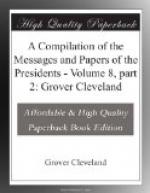It appears that on June 30, 1883, the whole number of post-offices was 47,863, of which 1,632 were established during the previous fiscal year. The number of offices operating under the system of free delivery was 154.
At these latter offices the postage on local matter amounted to $4,195,230.52, a sum exceeding by $1,021,894.01 the entire cost of the carrier service of the country.
The rate of postage on drop letters passing through these offices is now fixed by law at 2 cents per half ounce or fraction thereof. In offices where the carrier system has not been established the rate is only half as large.
It will be remembered that in 1863, when free delivery was first established by law, the uniform single-rate postage upon local letters was 1 cent, and so it remained until 1872, when in those cities where carrier service was established it was increased in order to defray the expense of such service.
It seems to me that the old rate may now with propriety be restored, and that, too, even at the risk of diminishing, for a time at least, the receipts from postage upon local letters.
I can see no reason why that particular class of mail matter should be held accountable for the entire cost of not only its own collection and delivery, but the collection and delivery of all other classes; and I am confident, after full consideration of the subject, that the reduction of rate would be followed by such a growing accession of business as to occasion but slight and temporary loss to the revenues of the Post-Office. The Postmaster-General devotes much of his report to the consideration in its various aspects of the relations of the Government to the telegraph. Such reflection as I have been able to give to this subject since my last annual message has not led me to change the views which I there expressed in dissenting from the recommendation of the then Postmaster-General that the Government assume the same control over the telegraph which it has always exercised over the mail.
Admitting that its authority in the premises is as ample as has ever been claimed for it, it would not, in my judgment, be a wise use of that authority to purchase or assume the control of existing telegraph lines, or to construct others with a view of entering into general competition with private enterprise.
The objections which may be justly urged against either of those projects, and indeed against any system which would require an enormous increase in the civil-service list, do not, however, apply to some of the plans which have lately provoked public comment and discussion. It has been claimed, for example, that Congress might wisely authorize the Postmaster-General to contract with some private persons or corporation for the transmission of messages, or of a certain class of messages, at specified rates and under Government supervision. Various such schemes, of the same general nature, but widely differing in their special characteristics, have been suggested in the public prints, and the arguments by which they have been supported and opposed have doubtless attracted your attention.




